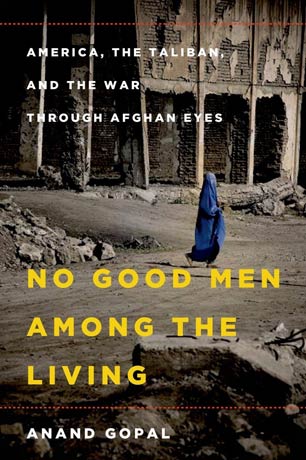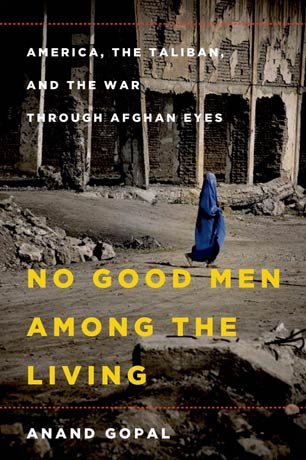You can make a contribution to Truthout and get a copy of “No Good Men Among the Living: America, The Taliban, and the War Through Afghan Eyes.” Click here and order the book now.
 (Image: Metropolitan Books)Former US Army Ranger and conscientious objector Fanning reviews Anand Gopal’s No Good Men Among the Living, a book that was recently be long-listed for the National Book Award and Truthout’s Progressive pick of the week.
(Image: Metropolitan Books)Former US Army Ranger and conscientious objector Fanning reviews Anand Gopal’s No Good Men Among the Living, a book that was recently be long-listed for the National Book Award and Truthout’s Progressive pick of the week.
It has been more than a decade since I trudged through the mountains of Afghanistan, and drove over the country’s broken roads for the 2nd US Army Ranger battalion. I did two tours in the country. The first, in 2002, was willingly. The second, in 2004, was by force after declaring conscientious objector status. Leaving the Rangers as a CO was one of the most difficult challenges of my life. There are many reasons I left, some of which I am still coming to understand – Anand Gopal’s book No Good Men Among the Living has helped me reconcile these reasons more than any of the many books I’ve read on Afghanistan.
Gopal’s book answers the questions that haunted me both during and after my tours: What were the women who would peek out from second floor windows in dusty clay homes feeling as we barreled down their streets in armored Humvees with 50-calibur machine guns at the ready? Were those who fired Cold War-era Russian rockets at our camps motivated by knowing we would respond in kind with 500-pound bombs dropped from jets? What went through the minds of Afghan men when we stormed into their homes, threw sandbags over their heads in night raids? Why did so many of our missions seem like we were little more than pawns in village disputes? Were we preventing another 9/11? Did they really hate us for our freedom? Was it Islam that was creating terrorists – or was it US imperialism?
Gopal moved to Afghanistan in 2008, and for more than two years found the answers to these questions. He wasn’t part of the embedded press crew that is vetted for their allegiance to the US mission. Gopal traveled to remote regions of the country on the most treacherous roads in the world to talk to those who were eye-witness to the Russian occupation in the ’80s, the country’s Civil War in the ’90s, and then the US occupation post 9/11. Gopal gets in-depth with a US-backed warlord, a Taliban fighter and a housewife.
Akbar Gul, aka Mullah Cable, (a nickname he received for his brutal use of cable whips during the Civil War) a Taliban commander and father, retreated to Pakistan as the Taliban fell. As a refugee, without work prospects, he returned to Afghanistan and opened a cell-phone repair shop – a highly valued profession in a place where cell-phones are not easily replaced. Gul’s attempt to live as a simple merchant proved impossible as shakedowns from US-backed Afghan police and US military raids ended his business. When it came to supporting his family, his options became: fight the US occupation as a part of the Taliban or starve.
Jan Mohammed, a close friend of Hamid Karzai, pedophile, and vicious warlord, was appointed governor of Oruzgan Province, where he manipulated the US military to pad his own pockets with millions of dollars by providing false claims that his political rivals were members of the Taliban. Gopal shows that the US aligned with men like Momhamad because the system the US put in place, as Gopal puts it, “did not reward stability legitimacy or popularity. Instead it rewarded those who could serve up enemies.” We see that the US was quite content to cast a wide and bloody net over the country. Gopal relates stories of many who did everything possible to align themselves with US interests. But even these people found themselves imprisoned indefinitely without due process in Guatanamo and the like. The US saw little difference between innocent Afghans and members of the Taliban. They just wanted blood – anyone’s.
Heela, a college-educated housewife, is the most fascinating person in the book. Run out of Kabul during the Civil War to an isolated village dominated by primitive religious rites, Heela was confined to her home under threat of death, with permission to leave only under the supervision of a blood-related male chaperone. These impossibly restrictive conditions did not prevent Heela from creating an underground educational system for other women in her village. These efforts, as well as the actions of her politically active husband made her a target of Jan Mohammad. She lost her husband to the warlord’s henchmen and barely escaped from her village with her own and her children’s lives.
Gopal frames these stories with the ten-year occupation of the country by the Russians, the US financing of fundamentalists during the 80s, and the horrific Civil War that befell the country. We learn why the Taliban came to rule following the power vacuum left by the Russians and the US when both turned a blind eye to the country following the collapse of the Soviet Union.
The most frustrating revelations of the book, for those of us who lost friends in Afghanistan, were the details of why the Taliban surrendered, and al-Qaeda fled to Pakistan within months of the US invasion. Everything that happened, the US casualties, the thousands of Afghan civilian deaths, and the half a trillion dollars spent not on infrastructure but destruction could have been avoided if the US had accepted the surrender. But the Bush and then Obama administration demanded unending blood.
No Good Men Among the Living is not a self-serving adventure story about what it takes to get a report from a war-torn and exotic place like Afghanistan. For the most part, Gopal takes himself out of the book and we are led by those we never hear from in the mainstream media. Despite not mentioning very much about his own story, Gopal should be commended and thanked for putting his life on the line to create such an important book.
Poverty, war, and decades of occupation have made finding new and creative survival techniques a way of life for most Afghans. It is the pressing weight of uncertain future and the regular threat of loss that make allegiances so fickle for many. Anyone who understands this will see why the Taliban surrendered so quickly following the initial US invasion. And this is where we can begin to find the motivation for Gopal’s title. “No good men among the living” is a Pashtun proverb that means, as Gopal writes:
There are no heroes, no saviors in this world. Neither side of the conflict offered much hope for a better future. The categories of the American war on terror – terrorists, fundamentalists and democrats – mattered little, not when [the] abiding goal was simply to finish each day.
Give this book to anyone you know who plans on joining the US military or blames Islam for the US occupation of Afghanistan – they are sure to rethink their position after reading it. There is hope, much humanity, and the power to end our unending wars in Gopal’s magnificent work.
Media that fights fascism
Truthout is funded almost entirely by readers — that’s why we can speak truth to power and cut against the mainstream narrative. But independent journalists at Truthout face mounting political repression under Trump.
We rely on your support to survive McCarthyist censorship. Please make a tax-deductible one-time or monthly donation.
